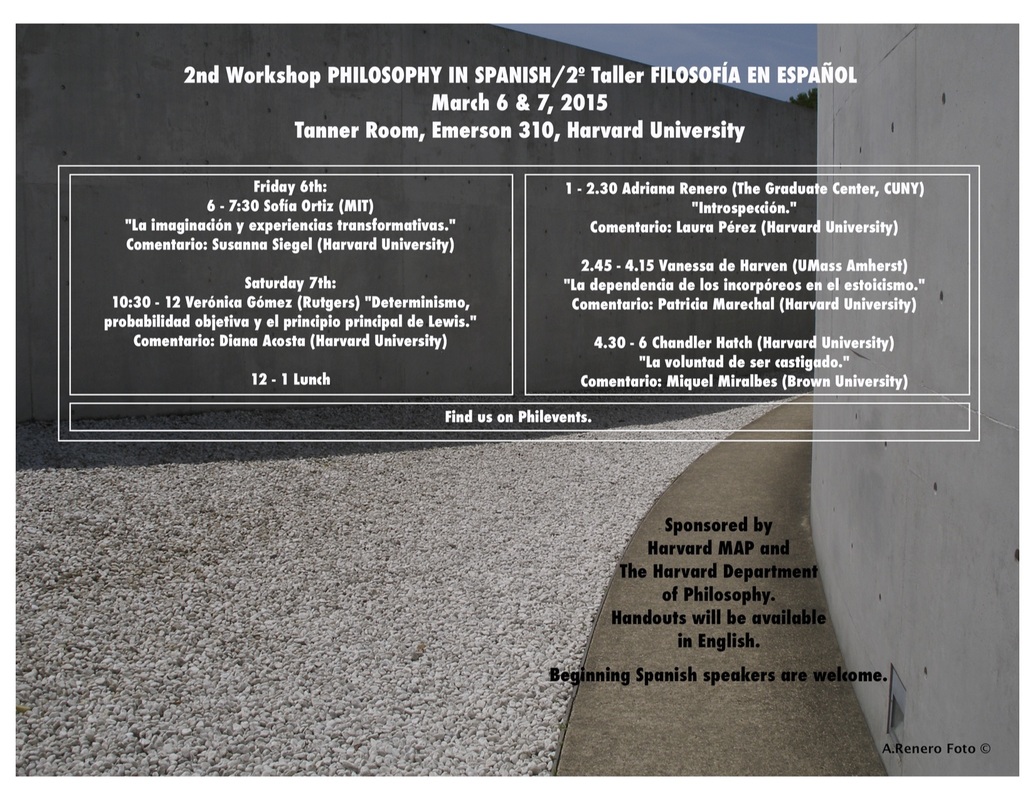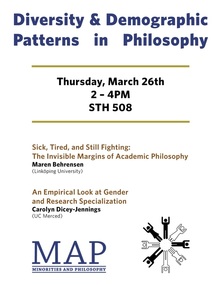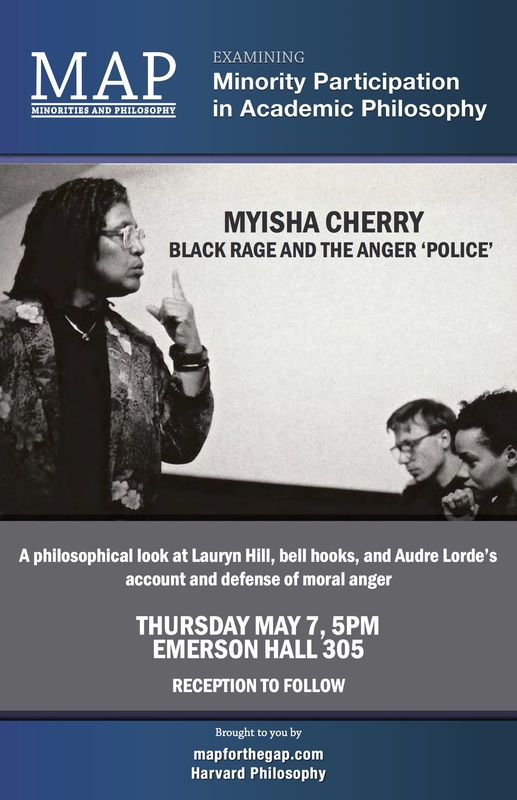|
Each week this summer, we'll be highlighting exciting MAP events from the last academic year. This week, a talk at CMU by Cartographer Liam Bright. Open Forum With Carole Lee
In Spring term of 2015 Carnegie Mellon University's Minorities and Philosophy chapter held an open forum on departmental culture, with special guest participant Carole Lee. Dr. Lee had come to CMU to give a talk in the departmental colloquium series, and we in CMU MAP took the opportunity of her presence to tap into her expertise on issues concerning bias in philosophy and demographics of philosophy. We at CMU MAP have had a lot of success with this strategy -- invite people who are independently in the area of our department to participate in talks or events we organise. It saves on cost to the chapter, and we've found that academics are willing and indeed happy to assist the Minorities and Philosophy organisation in our important work. So, especially if your department is willing to assist MAP by providing a venue and snacks as CMU Philosophy thankfully has been, I definitely recommend reaching out to anybody who you know will be visiting your department and asking them to participate in MAP activities. You may be pleasantly surprised at how eagerly professors respond to such requests! The structure of the forum was kept deliberately simple: after some initial mingling with aforementioned snacks -- bagels and, incredibly importantly since this was in the morning, coffee -- we all sat round in a rough circle. Carole Lee was introduced and all participating were brought up to speed on what Dr. Lee has been up to that she may be able to provide some expert guidance on. After that, participants were asked to air any thoughts they had about departmental policy, climate, or culture, that may be MAP related, and we discussed whatever was raised in light of the combined experience and expertise of those in the room. One pleasant feature of this meeting was that many of our CMU faculty were friendly and active participants in this discussion, allowing us to be sure that our discussion and its results would have some impact on departmental policy. That said, in discussion with participants after the event, I found that what many said they appreciated most was just the opportunity to discuss issues they had been thinking about some time but had not had the opportunity to discuss with somebody they felt had some expertise on the matter. The meeting hence had all the usual benefits of communal deliberation, while also, through the presence of the invited speaker, allowing participants to gain access to expert knowledge in a friendly and casual setting. The event was a big success, and I encourage others to hold their own open forums with invited speakers!
0 Comments
Each week this summer, we'll be highlighting exciting MAP events from the last academic year. This week, two events at Harvard by Cartographer Patricia Marechal.  Taller Diálogo de Filosofía en Español/ Workshop of Philosophy in Spanish This bilingual event featured five Spanish speakers who work and study in Philosophy departments in American Universities and five bilingual commentators. Talks and comments were in Spanish, but a handout in English was provided and discussions were in both English and Spanish. The goal was to offer a sample of the diversity of the work done by Spanish-speaking philosophers who are in the dominantly English-speaking world and explore the richness of Analytic work done in different languages. By discussing philosophical work in English and Spanish simultaneously we can test our theories for linguistic and conceptual parochialism. Other goals were to develop a sense of shared experiences for members of underrepresented groups in mainstream philosophy, and establish a community of support to deal with challenges and difficulties faced by linguistic minorities in academic philosophy. Myisha Cherry, "Black Rage and the Anger Police: A philosophical look at Lauryn Hill, belle hooks, and Audre Lorde's account and defense of moral anger"
Our Harvard-MAP guest-speaker for the Fall term was the talented and inspirational Myisha Cherry, who presented for us a talk centered on the legitimacy and appropriateness of experiencing anger in situations of racial oppression. Myisha defended the productive role of moral anger to end situations of injustice. The event took place in the Philosophy Department, in our regular colloquia room. It attracted around 50 people, including professors from the Philosophy Department at Harvard, and both Harvard and MIT graduates and undergraduates from different departments. The talk was followed by a reception and party where attendees and the speaker continued the discussion in an informal way. In the wake of the events in Ferguson and Baltimore, Myisha's talk was Harvard-MAP's attempt to elicit discussion about pressing social issues in our philosophical community. Each week this summer, we'll be highlighting exciting MAP events from the last academic year. This week, Boston University Representative Stacey Goguen tells us about their colloquium on diversity and demographic patterns.  BU Colloquium on Meta-Philosophy: Diversity & Demographic Patterns in Philosophy BU's MAP chapter invited two philosophers to speak about the profession and current demographic issues that they find pressing. Maren Behrensen (whose work includes the ethics of immigration and technology, gender testing in sports, and how romantic love is or is not like patriotism) shared her thoughts about the profession of philosophy in the wake of Peter Railton's Dewey Lecture at the 2015 Central APA meeting. She discussed the various ways philosophers may struggle with depression. She also argued that it was important (and brave) for philosophers like Railton to talk openly about their struggles, though she cautioned us not to take his narrative as the representative one. Perhaps most importantly, we should target the sort of stigma and bias that make it currently dangerous for some philosophers to be open and up front about their mental health. But there are other factors, too, that lead philosophy to becoming a sort of "depression machine." She then dipped into some later Wittgenstein to discuss how issues of mental health can be tied up with the naturalization of learned skill sets - i.e., how the self-conception of the profession can make you feel inadequate because it relies on the notion that success equals talent. Carolyn Dicey Jennings (whose main area of research is in the philosophy of mind and cognitive science, with a secondary research interest in demographic patterns in the profession) presented some preliminary findings: "The first part of the talk is based on a collaborative project with Eric Schwitzgebel. Our research question is whether women and men tend to specialize in different areas of philosophy. In this talk, I will present some initial findings on this question through analyses of three separate databases. The second part of the talk examines both potential sources and prospective applications of these findings. On the side of potential sources, I will be discussing a few alternative hypotheses that aim to explain the source of gender differences in research specialization, including the work of my graduate student, Yuliya Chernykhovskaya, who is currently testing one of these hypotheses. On the side of prospective applications of this research, I will discuss the efforts we have taken at UC Merced to promote diversity in our philosophy program and some initial results of these efforts." |
NEWSUpdates on MAP and MAP-related happenings.
Please contact us here for suggestions, comments, or job postings. Archives
December 2023
Categories |
|
MAP is generously supported by the Marc Sanders Foundation and the Philosophy of Science Association.
|


 RSS Feed
RSS Feed